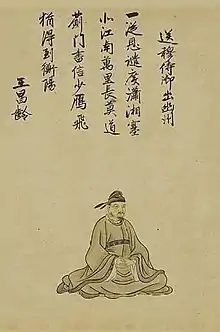Wang Changling | |||||||
|---|---|---|---|---|---|---|---|
王昌齡 | |||||||
 Wang Changling, painted by Kanō Tsunenobu in the 18th century. | |||||||
| Born | 698 | ||||||
| Died | 756 (aged 57–58) | ||||||
| Occupation | Poet | ||||||
| Chinese name | |||||||
| Chinese | 王昌齡 | ||||||
| |||||||
| Shaobo | |||||||
| Chinese | 少伯 | ||||||
| |||||||

Wang Changling (Chinese: 王昌齡; pinyin: Wáng Chānglíng; 698–756) was a major Tang dynasty poet. His courtesy name was Shaobo (少伯). He was originally from Taiyuan in present-day Shanxi province, according to the editors of the Three Hundred Tang Poems, although other sources claim that he was actually from Jiangning near modern-day Nanjing. After passing the prestigious jinshi examination, he became a secretarial official and later held other imperial positions, including that of an official posting to Sishui (汜水), in what is currently Xingyang, in Henan province. Near the end of his life he was appointed as a minister of Jiangning county. He died in the An Lushan Rebellion; between the 10th month of the 14th year of the Tianbao era (755 CE) and the second year of the Zhide era (757 CE), he was executed by the Tang official Lü Qiuxiao (闾丘晓). When Lü later was sentenced to death by another official Zhang Hao (张镐), he pleaded for mercy, citing the fact that he had kin to take care of. Zhang's retort was, "Then, who's left to take care of Wang Changling's kin?". Lü went silent after that.[2][3]
He is best known for his poems describing fictional battles in the frontier regions of western China. He also wrote an homage to the Princess Pingyang, Lady Warrior of the early Tang dynasty.[4] Wang Changling was one of the competitors in the famous wine shop competition along with Gao Shi and Wang Zhihuan.[5]
Notes
- ↑ From a poem by Wang Changling, "The night is still and a hundred flowers are fragrant in the western palace. She orders the screen to be rolled up, regretting the passing of spring with the Yunhe across her lap. She gazes at the moon, the colors of the trees are hazy in the indistinct moonlight."
- ↑ ((丘)辞曰:‘有亲,乞贷余命。’镐曰:‘王昌龄之亲欲谁养?’晓默然。), New Book of Tang, chap. 203
- ↑ Rexroth (1970): p. 132.
- ↑ "Song of the Spring Palace – Wang Changling". August 10, 2018.
- ↑ Wu (1972): pp. 118-119
References
- Rexroth, Kenneth (1970). Love and the Turning Year: One Hundred More Poems from the Chinese. New York: New Directions.
- Wu, John C. H. (1972). The Four Seasons of Tang Poetry. Rutland, Vermont: Charles E.Tuttle. ISBN 978-0-8048-0197-3
Further reading
- (Three Hundred Tang Poems), Taipei: 三民書局印行, 2001.
- Varsano, Paula. "Whose Voice Is It Anyway? A Rereading of Wang Changling's 'Autumn in the Palace of Everlasting Faith: Five Poems". In Journal of Chinese Literature and Culture. Volume 3, issue 1 (April 2016), pp. 1–25.
External links
- Works by Wang Changling at LibriVox (public domain audiobooks)

- Books of the Quan Tangshi that include collected poems of Wang Changling at the Chinese Text Project: